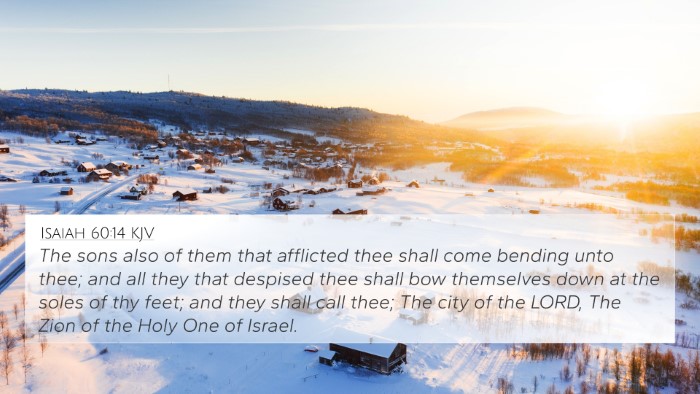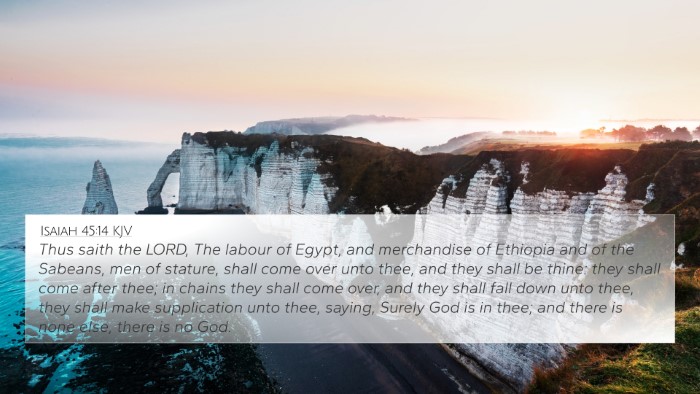Understanding Acts 16:39
Acts 16:39 states: "And they came and besought them, and brought them out, and desired them to depart out of the city." This verse highlights the aftermath of Paul and Silas's imprisonment in Philippi and how the authorities responded once they realized their wrongful treatment of these men.
Summary of Commentary Insights
This passage reflects the themes of justice, repentance, and divine intervention. Through a combination of insights from Matthew Henry, Albert Barnes, and Adam Clarke, we can glean a deeper understanding of this scripture.
Matthew Henry's Commentary
Henry reflects on the request made by the rulers to Paul and Silas, emphasizing their recognition of Paul and Silas’s Roman citizenship and the fear of repercussions for their actions. The rulers acknowledged their guilt by seeking to appease Paul and Silas, showcasing the notion that even those in positions of power are subject to accountability.
Albert Barnes' Commentary
Barnes adds that the authorities not only wanted to appease Paul and Silas but also aimed to maintain order in the city. This request symbolizes an attempt to restore peace following the civil disturbance that ensued from Paul and Silas's actions. Barnes highlights that their actions were motivated by fear and the desire to mitigate consequences, revealing a deeper societal theme of fear of divine justice.
Adam Clarke's Commentary
Clarke notes the irony in how the once-powerful magistrates who imprisoned Paul and Silas were now begging them. He indicates that this moment illustrates the reversal of fortune that often occurs in biblical narratives, where the oppressed rise above their oppressors through divine will. Clarke encourages readers to view this as a lesson in humility and the power of faith.
Thematic Connections
Acts 16:39 resonates with various themes within biblical narratives, such as:
- Divine Justice: The fear expressed by the magistrates parallels biblical instances where divine justice prevails.
- Humility: The plea of the rulers symbolizes the necessity of humility in leadership.
- Redemption: The opportunity for the rulers to apologize serves as a moment of potential redemption.
Cross-References Related to Acts 16:39
Understanding the connections between Bible verses enhances the depth of interpretation. Here are 8 cross-references that are pertinent to Acts 16:39:
- Romans 13:1: Discusses the role of authorities and their divine appointment.
- Philippians 1:28-30: Reminds believers of facing opposition with confidence in their faith.
- 1 Peter 2:13-14: Highlights the necessity of submitting to human authorities for the Lord's sake.
- John 19:12-16: Illustrates the power dynamics in a legal context similar to that faced by Paul.
- Matthew 10:16: Encourages believers to be wise as serpents and innocent as doves, reflecting the wisdom shown by Paul and Silas.
- Acts 4:18-20: Reveals the apostles' commitment to preaching despite governmental opposition.
- Galatians 6:7: Promises that intentions will have consequences, aligning with the magistrates’ fear of repercussions.
- Luke 17:3: Raises the importance of facing wrongs with humility, similar to the rulers’ approach to Paul and Silas.
Conclusion
Acts 16:39 serves as a profound reminder of the complexities of justice, authority, and humility. By examining this verse through the lenses of various commentaries, we uncover the rich thematic content and inter-Biblical connections that enhance context and understanding. For those engaged in Bible study, employing tools for cross-referencing and Bible concordance can lead to a deeper grasp of the scriptural message and help identify further connections, enriching one's study experience.
Further Study Recommendations
For readers seeking to delve deeper into Bible verse cross-references, the following methods are recommended:
- Utilize a Bible concordance to find related scriptures.
- Explore a Bible cross-reference guide for thematic studies.
- Engage in cross-reference Bible study groups.
- Employ cross-referencing Bible study methods to enhance understanding.












